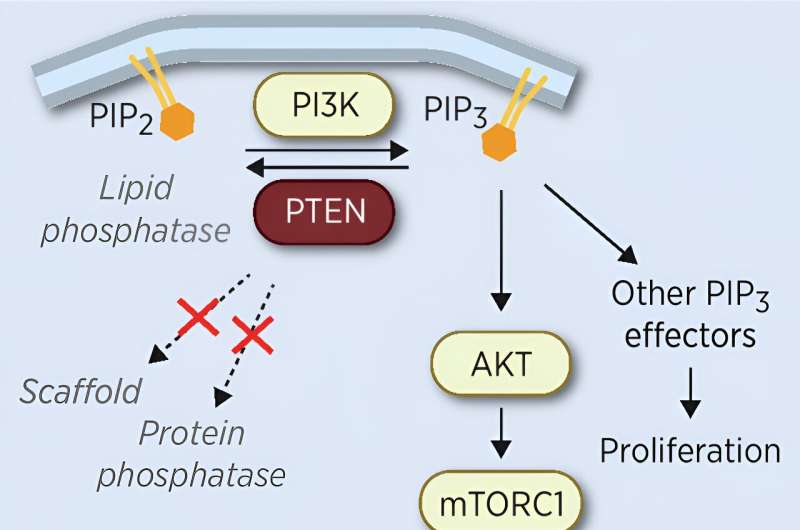This article has been reviewed according to Science X's editorial process and policies. Editors have highlighted the following attributes while ensuring the content's credibility:
fact-checked
peer-reviewed publication
trusted source
proofread
Researchers characterize the tumor suppressor activity of the PTEN protein in melanoma

Cutaneous melanoma is considered the deadliest form of skin cancer because it's aggressive and tends to spread quickly through the body. While scientists have made significant progress in understanding the molecular mechanisms leading to melanoma development, it is still unclear how the PTEN protein regulates melanoma progression.
In a new study published in Cancer Research, Moffitt Cancer Center researchers reveal how the antitumor activity of PTEN suppresses the cancer-promoting activity of the FRA1 transcription factor through the AKT signaling pathway.
Mutations in PTEN commonly occur during melanoma progression, blocking its tumor-inhibitory activity and causing tumor cells to develop more aggressive characteristics. PTEN serves several functions, including inhibition of the AKT signaling pathway, which promotes tumor progression by stimulating processes such as proliferation, survival, and invasion.
Numerous studies in melanoma and other cancers have shown that reduced activity of PTEN enhances signaling through the cancer-promoting AKT pathway. However, AKT inhibitors have not been effective in treating patients with melanoma in clinical trials, suggesting that scientists still do not entirely understand the molecular mechanisms of PTEN tumor suppression and AKT tumor promotion in melanoma.
"The underwhelming preclinical and clinical performances of these inhibitors have prompted two fundamental questions regarding PTEN-mediated melanoma suppression," said Florian Karreth, Ph.D., associate member of the Department of Molecular Oncology at Moffitt. "First, does PTEN suppress melanoma through its lipid phosphatase activity? And second, is AKT a crucial signaling node in PTEN-deficient melanoma?"
Karreth and a team of Moffitt researchers performed cell culture and mouse model studies to determine how PTEN inhibits melanoma development and whether alterations in PTEN lead to AKT tumor promotion activity. They discovered that PTEN predominantly inhibits melanoma cell proliferation, invasion, and tumor growth through its lipid phosphatase activity. In contrast, its protein phosphatase and scaffolding activity have limited to no inhibitory effects on melanoma progression.
Additional investigations found that AKT activity could overcome the antitumor activity of PTEN to promote melanoma growth and invasion, suggesting that the regulation of AKT by PTEN is particularly important at the later stages of melanoma formation, such as metastasis. The researchers also determined that AKT controlled the production of the FRA1 protein via the mTOR regulator of protein translation to promote melanoma progression.
"Taken together, not only does the discovery of the AKT/mTOR/FRA1 axis add to our understanding of AKT-mediated melanomagenesis, but it may also offer new opportunities for targeting PTEN-deficient melanoma," Karreth said.
More information: Xiaonan Xu et al, PTEN Lipid Phosphatase Activity Suppresses Melanoma Formation by Opposing an AKT/mTOR/FRA1 Signaling Axis, Cancer Research (2024). DOI: 10.1158/0008-5472.CAN-23-1730



















